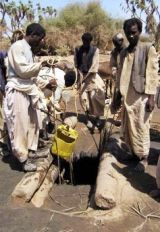Sudan’s Eastern Front rebels launch first offensive
ASMARA, June 21 (AFP) — Created only four months ago, Sudan’s Eastern Front rebel movement is the latest participant in the country’s volatile power struggles, of which the war and humanitarian crisis in the western Darfur region is now the worst.

|
|
Beja people collect water in the rebel-controlled area of eastern Sudan, near the border with Eritrea June 4, 2005. The Beja people live a virtually medieval existence among desert plains and stony mountains in remote and rebel-controlled eastern Sudan. Lack of development in their region is one of the main grievances that spur the Beja rebels who have controlled this small area on the Eritrean border since early 1997. (Reuters). |
But although it launched its first military operation against government troops in eastern Red Sea state at the weekend, most of the front’s components have been battling Khartoum separately for years.
A coalition of eastern Sudan’s two main dissident factions — the Beja Congress and the Free Lions — and assorted sympathizers, the front was born in February of rising resentment over perceived marginalization of the east.
And by the end of March, the joint force had held its first mass meeting and show of force in rebel-held territory in eastern Sudan, announcing to a small group of international journalists that it was ready for war.
“Our region lacks hospitals, schools, water, transport systems, everything,” front president Musa Mohamed Ahmed told AFP at that meeting, which received little attention from world media more concerned with Darfur.
“If the government is ready to solve the problem peacefully, we are also ready,” Ahmed said then. “If they are not, we are also ready.”
During that congress, held in the desert near the Eritrean border, the rebels showed off their military hardware before several thousand enthusiastic supporters and put on display young recruits eagerly signing up to fight.
One of its aims was to unite east Sudan’s different ethnic groups behind a single entity, the Eastern Front, to battle what they see as Khartoum’s unequal distribution of oil wealth and other resources.
In late January, the cause of the Beja Congress made headlines briefly when at least 14 and as many as 36 of its supporters were killed by Sudanese security forces breaking up a demonstration in the eastern city of Port Sudan.
With the launch of the weekend operation near the town of Tokar south of Port Sudan, the rebels say they have succeeded in uniting once disparate forces and dealt a blow to Khartoum which claims to have repelled the attack.
“Khartoum says they have stopped our progress, it is not true,” rebel leader Salah Barqueen told AFP in Asmara, where the Eastern Front and its various members all have offices. “All the defenses of our enemy are broken.”
Sudanese officials have denied any gains by the rebels but have said they will deal severely with the group, suggesting some truth in Eastern Front claims to have captured troops and military equipment.
The main component of the Eastern Front is the Beja Congress which first took up arms against Khartoum in 1994 and was followed five years later by the Free Lions.
The Beja are non-Arab Muslims who have lived in eastern Sudan for more than 2,000 years. The Rashaida, who form the Free Lions, are also Muslims but are descended from 19th-century immigrants to Sudan from the Arabian peninsula.
Like the two main rebel groups in Darfur, the Sudan Liberation Movement (SLM) and the Justice and Equality Movement (JEM), the Eastern Front accuses Khartoum of “marginalizing” the region where they live.
Despite its presence at Darfur peace talks now under way in Nigeria, the JEM has joined the current Eastern Front campaign which is certain to raise already heightened tensions between Asmara and Khartoum.
A statement signed by the Joint Eastern Forces — which includes JEM and the Eastern Front — claimed that 17 government troops, including a senior officer, were captured by their men in the operation that began on Sunday.
The statement said attacks on a garrison led to the seizure of a significant amount of weaponry during the rebel push towards Tokar, halfway between the Eritrean border and Port Sudan.
Sudan regularly accuses Eritrea of providing the rebels with military support but Asmara regularly rejects these accusations, saying it only gives them political support.
Their common border has been closed since 2002 when Khartoum accused Asmara of supporting an offensive by rebels near the eastern town of Kassala.
Red Sea state governor Major General Hatim al-Wasilah al-Sammani accused Eritrea of backing the offensive and warned the rebels of retaliatory operations by government forces.
